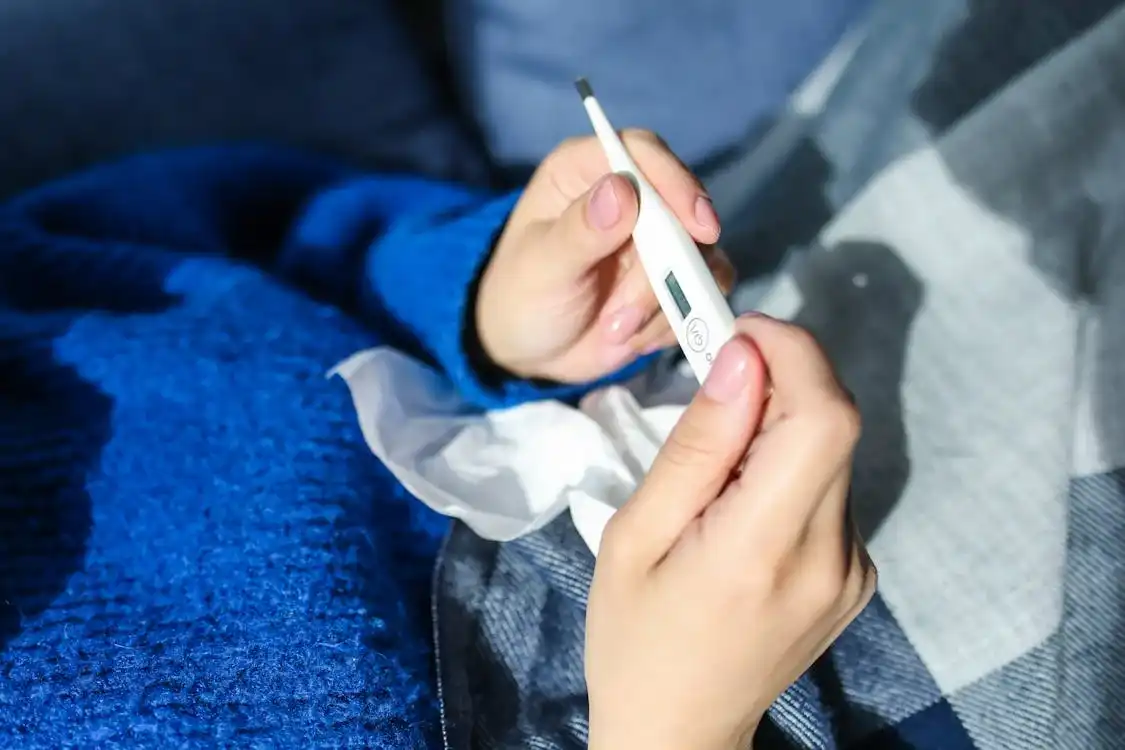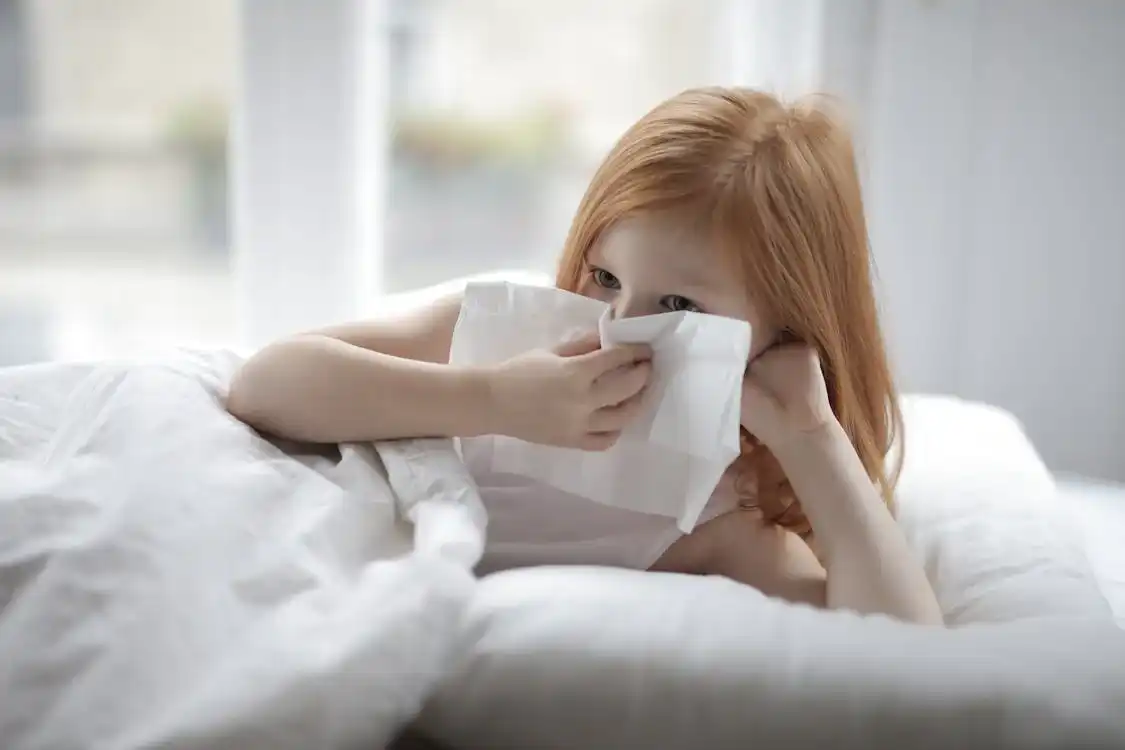Dreams are mysterious and often leave us wondering about their meanings. Among the many types of dreams, fever dreams stand out because of their intense and often surreal nature. Have you ever woken up in a sweat, your heart racing, after dreaming that you had a high fever? Fever dreams are more common than you might think, and they can be quite puzzling.
Why Do Fever Dreams Happen and Do They Have Meaning?

In this blog post, we’ll explore what fever dreams are, what they might mean, and how to interpret them. We’ll also delve into the spiritual and psychological aspects of these dreams, and by the end, you’ll have a clearer understanding of what your mind might be trying to tell you when you dream of having a fever.
What Are Fever Dreams?
Fever dreams are vivid, often bizarre dreams that occur when you have a fever. These dreams are typically more intense than regular dreams and can be quite unsettling. When you’re sick and your body temperature rises, your brain activity changes, which can lead to these strange and vivid dreams.
Unlike regular dreams, which can be pleasant or neutral, fever dreams are usually uncomfortable, confusing, and sometimes even frightening. They often involve strange scenarios, distorted realities, and heightened emotions.

Why Do We Have Fever Dreams?
Fever dreams occur because of the changes in brain activity when your body temperature is elevated. When you have a fever, your body is fighting off an infection, and this battle affects your brain as well. The higher temperature can disrupt normal brain function, leading to more vivid and unusual dreams.
Additionally, the discomfort of being sick—such as feeling hot, cold, or achy—can influence the content of your dreams. Your body’s stress and discomfort can manifest in your dreams as strange or troubling imagery.
Common Themes in Fever Dreams
While fever dreams can vary widely from person to person, there are some common themes that many people experience. These themes often reflect the physical and emotional stress that comes with being ill.
- Distorted Reality: Fever dreams often involve strange and distorted realities. Objects might change size or shape, time might move differently, or you might find yourself in a place that’s both familiar and unfamiliar at the same time.
- Repetitive Scenarios: Many people report experiencing repetitive scenarios in their fever dreams. For example, you might find yourself stuck in a loop, repeating the same action or scene over and over again.
- Anxiety and Fear: Fever dreams can be anxiety-inducing. You might find yourself in frightening situations, such as being chased or trapped, or you might feel a sense of dread or panic throughout the dream.
- Sensory Overload: Because fever dreams are so vivid, they can also involve intense sensory experiences. Colors might be brighter, sounds might be louder, and physical sensations might be more pronounced than in regular dreams.

Spiritual Meaning of Fever Dreams
From a spiritual perspective, fever dreams can be seen as a reflection of your inner turmoil or spiritual journey. Fever dreams might represent a period of transformation, where you are shedding old beliefs or patterns and emerging into a new phase of life.
In many spiritual traditions, illness is seen as a form of purification or a sign that you are undergoing a significant change. Fever dreams, with their intense and often challenging content, could be a way for your subconscious mind to process this transformation.
For some, fever dreams might also be seen as messages from the spiritual realm. The unusual and symbolic nature of these dreams could be interpreted as a form of communication from your higher self, spirit guides, or even ancestors.

Psychological Interpretation of Fever Dreams
Psychologically, fever dreams can be viewed as a manifestation of your subconscious mind dealing with the stress of being ill. When you’re sick, your body is under physical stress, and this stress can translate into your dreams.
Fever dreams might also be a way for your mind to process emotions that you’re not fully aware of when you’re awake. The strange and symbolic content of these dreams can be a reflection of your inner fears, anxieties, or unresolved issues.
In some cases, fever dreams might also be connected to the fever itself. The sensations of being hot, cold, or in pain can influence the content of your dreams, leading to scenarios that reflect your physical discomfort.

How to Interpret Fever Dreams
Interpreting fever dreams can be challenging because of their surreal and intense nature. However, there are some steps you can take to understand what these dreams might be trying to tell you.
- Consider Your Physical State: First, recognize that your fever is likely influencing your dream content. If you’re experiencing physical discomfort, such as pain or chills, this might be reflected in your dream.
- Look for Emotional Themes: Fever dreams often have strong emotional content. Pay attention to how you felt during the dream. Were you scared, anxious, or confused? These emotions can provide clues about what your subconscious mind is processing.
- Identify Repetitive Patterns: If your fever dreams involve repetitive scenarios or imagery, try to identify what these patterns might represent. Are you stuck in a loop in your waking life? Are there situations or feelings that you’re struggling to move past?
- Analyze the Symbols: Fever dreams are often filled with strange and symbolic imagery. Try to break down the symbols in your dream and see if they relate to anything in your life. For example, if you dream of being chased, this could represent a fear or anxiety that you’re trying to avoid.
- Reflect on Your Life Changes: Fever dreams can also be a sign of transformation or change. Consider if there are any significant changes happening in your life, whether they’re physical, emotional, or spiritual.

Are Fever Dreams a Cause for Concern?
While fever dreams can be unsettling, they are generally not a cause for concern. They are a normal part of the body’s response to illness and are usually temporary. Once your fever breaks and your body temperature returns to normal, your dreams should return to their usual state as well.
However, if you find that your fever dreams are particularly distressing or if they continue after your fever has subsided, it might be worth talking to a healthcare professional. In some cases, persistent or disturbing dreams can be a sign of an underlying issue, such as anxiety, stress, or a sleep disorder.
How to Deal with Fever Dreams
If you’re experiencing fever dreams, there are a few things you can do to make yourself more comfortable and reduce the intensity of these dreams.
- Stay Hydrated: Dehydration can make fever symptoms worse, which in turn can exacerbate fever dreams. Make sure you’re drinking plenty of fluids to stay hydrated.
- Keep Cool: Overheating can contribute to fever dreams. Try to keep your environment cool, and avoid heavy blankets or clothing that might make you too warm.
- Get Plenty of Rest: Rest is essential when you’re sick. Try to get as much sleep as possible, even if your fever dreams make it difficult. The more rest you get, the quicker your body can recover.
- Practice Relaxation Techniques: If your fever dreams are causing anxiety, try practicing relaxation techniques before bed, such as deep breathing, meditation, or gentle stretching.
- Talk to a Doctor: If your fever dreams are particularly distressing or if your fever is not improving, it’s important to seek medical advice. Your doctor can help you manage your symptoms and provide guidance on how to cope with your fever dreams.

Fever Dreams in Children
Children are especially prone to fever dreams because their bodies are still developing, and they are more likely to experience high fevers when they are sick. Fever dreams in children can be particularly intense and might involve frightening or confusing scenarios.
If your child is experiencing fever dreams, it’s important to reassure them that these dreams are a normal part of being sick. You can help them feel more comfortable by keeping them cool, encouraging them to rest, and offering comfort and reassurance if they wake up frightened.
It’s also important to monitor your child’s fever and seek medical advice if their fever is very high or if they are showing signs of distress.
Cultural and Historical Perspectives on Fever Dreams
Throughout history, fever dreams have been seen as powerful and significant experiences. In some cultures, they were believed to be visions or messages from the divine. Shamans, priests, and healers would sometimes enter a fevered state intentionally to receive guidance or insight from the spiritual realm.
In other cultures, fever dreams were seen as omens or warnings. They might have been interpreted as signs of an impending event or as a reflection of the dreamer’s moral or spiritual state.
Today, while we have a more scientific understanding of fever dreams, they still hold a certain mystique. Their intense and surreal nature continues to captivate the imagination and spark curiosity about the deeper workings of the mind.

What to Do After Having a Fever Dream
After having a fever dream, you might feel disoriented, anxious, or even a little scared. Here are some steps you can take to ground yourself and return to a sense of calm:
- Take Deep Breaths: Deep breathing can help calm your nervous system and bring your focus back to the present moment.
- Write It Down: If your fever dream was particularly vivid or intense, consider writing it down. This can help you process the dream and gain insight into what it might mean.
- Talk to Someone: Sometimes, sharing your dream with someone else can help you feel less isolated and more grounded. Whether it’s a friend, family member, or therapist, talking about your experience can provide comfort and clarity.
- Focus on Recovery: Remember that fever dreams are a symptom of being ill, and the best way to prevent them is to focus on getting better. Rest, hydration, and proper care are essential for a speedy recovery.
The Role of Sleep in Fever Recovery
Sleep plays a crucial role in your body’s ability to fight off illness. When you
sleep, your body goes into repair mode, working to heal and restore itself. This is especially important when you have a fever, as your immune system is actively fighting off an infection. Sleep helps to boost your immune response, reduce inflammation, and promote overall healing.
However, fever dreams can sometimes make it difficult to get restful sleep. The vivid and often unsettling nature of these dreams can lead to disturbed sleep patterns, frequent awakenings, and a sense of unease. This can create a cycle where poor sleep exacerbates your illness, making it harder for your body to recover.
To improve your sleep quality during a fever, consider the following tips:
- Create a Comfortable Sleep Environment: Make sure your bedroom is cool, quiet, and dark. Use lightweight bedding and avoid heavy blankets that can make you too warm. A fan or a cool mist humidifier can help maintain a comfortable temperature.
- Stick to a Sleep Schedule: Try to go to bed and wake up at the same time each day, even when you’re sick. This helps regulate your body’s internal clock and can make it easier to fall asleep and stay asleep.
- Limit Stimulants: Avoid caffeine, nicotine, and other stimulants, especially in the hours leading up to bedtime. These can interfere with your ability to fall asleep and stay asleep.
- Practice Relaxation Techniques: Relaxation exercises, such as progressive muscle relaxation, deep breathing, or guided meditation, can help calm your mind and body before bed. These techniques can also help reduce anxiety that might be contributing to your fever dreams.
- Stay Hydrated: Drinking plenty of fluids throughout the day can help reduce the intensity of your fever and the likelihood of fever dreams. However, try to limit fluid intake close to bedtime to avoid waking up frequently during the night.
- Seek Medical Advice: If your fever is persistent or your sleep is severely disrupted by fever dreams, consult with a healthcare professional. They can provide guidance on managing your symptoms and may recommend treatments to help improve your sleep quality.

Fever Dreams and Lucid Dreaming
Lucid dreaming is a state in which the dreamer becomes aware that they are dreaming and may even have some control over the dream’s content. While fever dreams are often chaotic and uncontrollable, some people have reported experiencing lucid dreaming during a fever.
If you find yourself becoming lucid during a fever dream, you might be able to exert some influence over the dream. This could involve changing the dream’s environment, altering the outcome of a scenario, or simply choosing to wake up from the dream.
Lucid dreaming during a fever can be a double-edged sword. On one hand, it might allow you to escape from a particularly distressing dream. On the other hand, the heightened intensity of fever dreams can make the lucid experience more overwhelming or difficult to manage.
If you’re interested in exploring lucid dreaming, even during times when you’re not sick, there are techniques you can practice to increase your chances of becoming lucid in your dreams. These include reality checks, keeping a dream journal, and setting intentions before sleep.
The Connection Between Fever Dreams and Nightmares
Fever dreams and nightmares share some similarities, particularly in their ability to evoke strong emotions and unsettling scenarios. However, there are some key differences between the two.
Nightmares are typically defined as distressing dreams that cause the dreamer to feel fear, anxiety, or sadness. They often involve themes of danger, threat, or loss, and can lead to sudden awakenings with a lingering sense of fear or unease.
Fever dreams, on the other hand, are not necessarily nightmares, although they can be. While fever dreams are often intense and uncomfortable, they don’t always involve fear or danger. Instead, they might be characterized by confusion, disorientation, or sensory overload.
That said, the physical discomfort of a fever can increase the likelihood of having nightmares, as your body’s stress response may heighten your emotions during sleep. If your fever dreams take on a nightmarish quality, it’s important to focus on strategies to reduce your fever and improve your overall comfort.
Fever Dreams in Different Cultures
The interpretation and significance of fever dreams vary widely across different cultures and historical periods. In some cultures, fever dreams are seen as a form of spiritual communication, while in others, they are regarded as a natural response to illness.
For example, in some Indigenous cultures, fever dreams were considered visions from the spirit world. Shamans or spiritual leaders might intentionally enter a fevered state to receive guidance or messages from the spirits. These dreams were often seen as a source of wisdom or insight and were treated with great reverence.
In contrast, in medieval Europe, fever dreams were sometimes viewed with suspicion or fear. During times of plague or widespread illness, fever dreams were often associated with superstition or seen as a sign of demonic possession. People experiencing such dreams might be subjected to rituals or prayers to ward off evil spirits.
In modern times, fever dreams are generally understood through a medical or psychological lens, but the cultural and spiritual interpretations of these dreams continue to influence how they are perceived.

The Science Behind Fever Dreams
From a scientific perspective, fever dreams are thought to result from the effects of elevated body temperature on brain function. When your body temperature rises, it can alter the normal processes of the brain, leading to changes in sleep patterns, brainwave activity, and dream content.
Specifically, the hypothalamus, a part of the brain that regulates body temperature, plays a key role in how fever affects dreaming. When you have a fever, the hypothalamus triggers various responses in the body to help fight off infection, including raising your body temperature. This temperature increase can affect the brain’s ability to regulate sleep, leading to more vivid and intense dreams.
Additionally, fever can disrupt the normal cycles of REM (rapid eye movement) sleep, the stage of sleep most closely associated with dreaming. When REM sleep is disrupted, it can lead to more fragmented and bizarre dreams, which are characteristic of fever dreams.
While much is still unknown about the precise mechanisms behind fever dreams, ongoing research into sleep, dreaming, and brain function continues to shed light on this fascinating phenomenon.
Fever Dreams and the Subconscious Mind
The subconscious mind plays a significant role in shaping the content of our dreams, including fever dreams. When we sleep, our subconscious mind processes thoughts, emotions, and experiences from our waking life, often bringing them to the surface in the form of dreams.
Fever dreams may provide a unique window into the subconscious mind, as the altered brain activity during a fever can bring repressed or unresolved emotions to the forefront. This might explain why fever dreams often involve intense or disturbing themes, as they may be a way for the subconscious mind to work through difficult emotions or experiences.
For example, if you’re feeling overwhelmed, anxious, or stressed in your waking life, these feelings might be amplified in your fever dreams. The strange and symbolic nature of these dreams can serve as a reflection of your inner state, offering insights into what’s going on beneath the surface of your conscious mind.
How to Use Fever Dreams for Personal Growth
While fever dreams can be unsettling, they can also provide valuable insights into your inner world. By paying attention to the themes, symbols, and emotions in your fever dreams, you can use them as a tool for personal growth and self-awareness.
Here are some ways to use fever dreams for personal growth:
- Reflect on Your Emotions: Fever dreams often bring intense emotions to the surface. Take some time to reflect on the feelings you experienced in your dream. Are these emotions present in your waking life? What might they be telling you about your current state of mind?
- Explore the Symbols: The symbolic nature of fever dreams can offer clues about your subconscious thoughts and feelings. Try to identify any recurring symbols or themes in your dreams and consider what they might represent in your life.
- Journal Your Dreams: Keeping a dream journal can help you track patterns in your fever dreams and gain a deeper understanding of their meanings. Write down as much detail as you can remember, including the emotions, symbols, and scenarios in your dreams.
- Seek Insight Through Meditation: After having a fever dream, consider meditating on the content of the dream. This can help you gain clarity and insight into what your subconscious mind is trying to communicate.
- Discuss Your Dreams with a Therapist: If your fever dreams are particularly intense or troubling, discussing them with a therapist can provide valuable insights and support. A therapist can help you explore the psychological aspects of your dreams and work through any unresolved emotions they may be bringing to the surface.
When to Seek Help for Fever Dreams
While fever dreams are usually harmless and a normal part of being ill, there are times when it might be necessary to seek help:
- Prolonged Fever: If your fever persists for more than a few days or is very high, it’s important to seek medical attention. A prolonged fever can be a sign of a more serious illness that requires treatment.
- Severe Distress: If your fever dreams are causing significant distress, anxiety, or fear, and you’re finding it difficult to cope, consider talking to a healthcare professional. They can help you manage your symptoms and provide guidance on how to reduce the intensity of your dreams.
- Sleep Disorders: If you’re experiencing ongoing sleep disturbances or nightmares, even after your fever has subsided, it might be worth consulting with a sleep specialist. Sleep disorders can contribute to vivid or distressing dreams and may require treatment.
- Mental Health Concerns: If your fever dreams are bringing up unresolved emotions or triggering anxiety or depression, seeking support from a mental health professional can be beneficial. They can help you work through the underlying issues that might be contributing to your distressing dreams.
Conclusion
Fever dreams are a fascinating and often intense aspect of our dream life, offering a unique glimpse into the mind’s response to illness. While they can be unsettling, understanding the causes, meanings, and interpretations of fever dreams can help demystify the experience and provide insights into our subconscious mind.
Whether you view fever dreams through a psychological, spiritual, or cultural lens, they hold valuable lessons about our inner world. By paying attention to the emotions, symbols, and themes in your fever dreams, you can use them as a tool for personal growth, self-awareness, and healing.
FAQs
What causes fever dreams?
Fever dreams are caused by the elevated body temperature associated with a fever, which alters brain activity and leads to more vivid and intense dreams.
Are fever dreams dangerous?
No, fever dreams are generally not dangerous. They are a normal response to fever and usually subside once the fever breaks.
Why are fever dreams so intense?
The intensity of fever dreams is due to the changes in brain function caused by the fever. These changes can lead to more vivid, surreal, and emotionally charged dreams.
Can children have fever dreams?
Yes, children can experience fever dreams, and they are often more intense due to their developing brains and higher likelihood of experiencing fevers.
Can I control my fever dreams?
While it’s challenging to control fever dreams, practicing lucid dreaming techniques or relaxation methods before bed may help reduce their intensity.
Should I be worried if I keep having fever dreams?
If your fever dreams persist after your fever has gone or are causing significant distress, it may be worth discussing them with a healthcare professional.
Do fever dreams have any spiritual significance?
Some people believe that fever dreams have spiritual significance, seeing them as a form of communication from the subconscious or the spiritual realm. However, interpretations vary depending on cultural and personal beliefs.

![Dreams About Teeth Falling Out [ Losing Teeth Meaning ]](https://dreamsinterpretations.com/wp-content/uploads/2024/08/Losing-Teeth-in-Dreams-150x150.webp)


